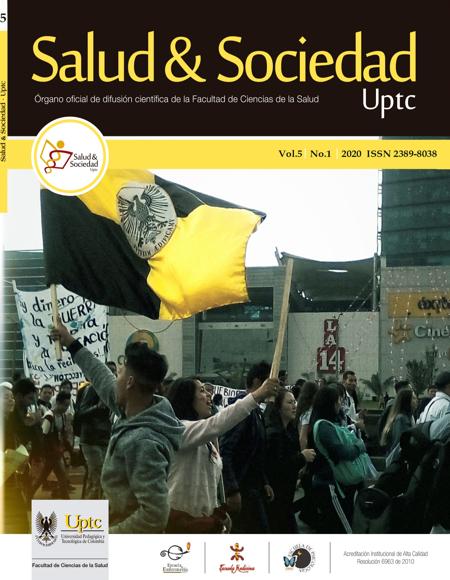The family in the health-illness process: A case analysis

Abstract
Objective: To interpret family dynamics and its influence on health-disease processes under the approach of health promotion. Methods: Qualitative analysis based on the study of a family case obtained through field records and family records of the Los Patriotas neighborhood, in the city of Tunja, Boyacá, during the year 2019. Results and conclusions: The family, as a system, is a group of individuals who have dynamic relationships with each other, and whose positive or negative events can affect different areas, among them, the health-disease process. The family and the community present aspects that enrich the understanding of the family physician in situations related to the social determinants of health and primary health care; their practice and their relationship with the community, institutional and cultural environments allow a better understanding of the family as a system, and, in this way, of the history of the disease or of the basic criteria of health.
Keywords
family, health, disease
References
- Dirección de Investigaciones y Grupo de Investigación Educación, Salud y Desarrollo Rural. “Proyecto Comunitario: promoción y mantenimiento de la salud individuo, familia y comunidad del barrio los patriotas del municipio de Tunja”. Cod. SGI 2597, UPTC-Tunja.
- Espinal I, Gimeno A, & González F. El enfoque sistémico en los estudios sobre la familia. Santo Domingo: Universidad Autónoma de Santo Domingo UASD y Centro Cultural Poveda; 2000.Disponible en: https://www.observatoriosocial.com.ar/images/articulos/Material _de_Consulta/El_Enfoque_Sistemico.pdf
- Bravo-Andrade H, Ruvalcaba Romero N, Orozco Solis M, González-Gaxiola, & Hernández-Paz. Introducción al modelo ecológico del desarrollo humano. (2018). Disponible en: https://www.researchgate.net/publication/328584009_Introduccion_al_modelo_ecologico_del_desarrollo_humano
- Cid Rodríguez Md, Montes de Oca Ramos R, Hernandez Díaz O. La familia en el cuidado de la salud. revmedicaelectronica [Internet]. 2014 [citado 2020 Ago 12];36(4):[aprox. 10 p.]. Disponible en: http://www.revmedicaelectronica.sld.cu/index.php/rme/article/vie w/1108Pérez
- Sánchez L, Mercado Rivas M, Espinosa Parra I. (2009). La familia y los procesos de enfermar. Revista Medigraphic. Año 1, Vol. 1, No. 1 Jun- Dic 2009. Disponible en https://www.medigraphic.com/pdfs/waxapa/wax2009/wax091t.pdf
- Campbell TL, McDaniel SH, Cole-Kelly K, Hepworth J, Lorenz A. Family interviewing: a review of the literature in primary care. Fam Med. 2002 May;34(5):312-8. PMID: 12038711. Disponible en: https://pubmed.ncbi.nlm.nih.gov/12038711/
- Hernández-Torres, I., Fernández-Ortega, MA, Irigoyen-Coria, A., Hernández-Hernández, MA, Importancia de la comunicación médico-paciente en medicina familiar. Archivos en Medicina Familiar [Internet]. 2006; 8 (2): 137-144. Recuperado de: https://www.redalyc.org/articulo.oa?id=50780211
- Sayers SL, White T, Zubritsky C, Oslin DW. Family involvement in the care of healthy medical outpatients. Fam Pract. 2006 Jun;23(3):317-24. doi: 10.1093/fampra/cmi114. Epub 2006 Feb 3. PMID: 16461451. Disponible en https://pubmed.ncbi.nlm.nih.gov/16461451/
- McGoldrick, M. y Gerson, R. Genogramas en la evaluación familiar. (1985) Barcelona: Gedisa 3ª ed. 2000. Pág. 17-164.
- Sánchez, Luz Mary. Evaluación y trazado de la estructura de la familia. Evaluación del conflicto conyugal: una guía para participantes. 2001. Serie de documentos de trabajo N°4. Facultad de humanidades. Escuela de trabajo social y desarrollo humano. Universidad del Valle. Disponible en: http://proyectos.javerianacali.edu.co/cursos_virtuales/posgrado/m aestria_asesoria_familiar/introduccion_encuentro_familias/Material/Sanchez,%20L.%20(2001).%202.%20Familiogramagenograma.pdf
- Garcia-Huidobro D, Mendenhall T. Family Oriented Care: Opportunities for Health Promotion and Disease Prevention. 2015. J Fam Med Dis Prev 1:009. Disponible en: https://clinmedjournals.org/articles/jfmdp/journal-of-familymedicine-and-disease-prevention-jfmdp-1-009.pdf
- Crespillo, Eduardo. La escuela como institución educativa.2010. Dialnet. ISSN-e 2171-9551, Nº. 5, 2010, págs. 257-261 Disponible en: https://dialnet.unirioja.es/servlet/articulo?codigo=3391527
- Méndez Sutil V, Louro Bernal I, Bayarre Vea H. Caracterización de la salud familiar en familias de niños con éxito escolar. Rev Cubana Med Gen Integr [Internet]. 2011 [citado 19 May 2014]; 27(1):1-9.Disponible en: http://scielo.sld.cu/scielo.php?script=sci_arttext&pid=S0864- 21252011000100001&lng=es
- Gómez Cobos, Erick, Adolescencia y familia: revisión de la relación y la comunicación como factores de riesgo o protección. Revista Intercontinental de Psicología y Educación [Internet]. 2008;10(2):105-122. Recuperado de: https://www.redalyc.org/articulo.oa?id=80212387006
- Verdugo Lucero, Julio César, Arguelles Barajas, José, Guzmán Muñiz, Jorge, Márquez González, Claudia, Montes Delgado, Roberto, Uribe Alvarado, Isaac, Influencia del clima familiar en el proceso de adaptación social del adolescente. Psicología desde el Caribe [Internet]. 2014;31(2):207-222. Recuperado de: https://www.redalyc.org/articulo.oa?id=21331836002
- Lohman BJ, Neppl TK, Senia JM, Schofield TJ. Understanding adolescent and family influences on intimate partner psychological violence during emerging adulthood and adulthood. J Youth Adolesc. 2013 Apr;42(4):500-17. doi: 10.1007/s10964-013-9923-7. Epub 2013 Feb 21. PMID: 23430562; PMCID: PMC3659774. Disponible en: https://www.ncbi.nlm.nih.gov/pmc/articles/PMC3659774/
- Newland RP, Ciciolla L, Crnic KA. Crossover Effects Among Parental Hostility and Parent-Child Relationships During the Preschool Period. J Child Fam Stud. 2015;24(7):2107-2119. doi:10.1007/s10826-014-0012-7. Disponible en: https://pubmed.ncbi.nlm.nih.gov/26097377/
- Peterson G.W. Family Influences on Adolescent Development. In: Gullotta T.P., Adams G.R. (eds) Handbook of Adolescent Behavioral Problems. Springer, Boston, MA. (2005) Disponible en: https://link.springer.com/chapter/10.1007%2F0- 387-23846-8_3#citeas
- Pesantes MA, Del Valle A, Diez-Canseco F, et al. Family Support and Diabetes: Patient's Experiences From a Public Hospital in Peru. Qual Health Res. 2018;28(12):1871-1882. doi:10.1177/1049732318784906 Disponible en: https://pubmed.ncbi.nlm.nih.gov/30066604/
- Pilowsky DJ, Wickramaratne P, Talati A, Tang M, Hughes CW, et al. Children of depressed mothers 1 year after the initiation of maternal treatment: findings from the STAR*DChild Study. (2008). Am J Psychiatry 165: 1136-1147. Disponible en https://pubmed.ncbi.nlm.nih.gov/18558646/
- Salazar de la Cruz, Miriam, & Jurado-Vega, Arturo. Niveles de Intervención Familiar. Acta Médica Peruana, (2013) 30(1), 37- 41. Recuperado en 17 de junio de 2020, de http://www.scielo.org.pe/scielo.php?script=sci_arttext&pid=S172 8-59172013000100007&lng=es&tlng=es